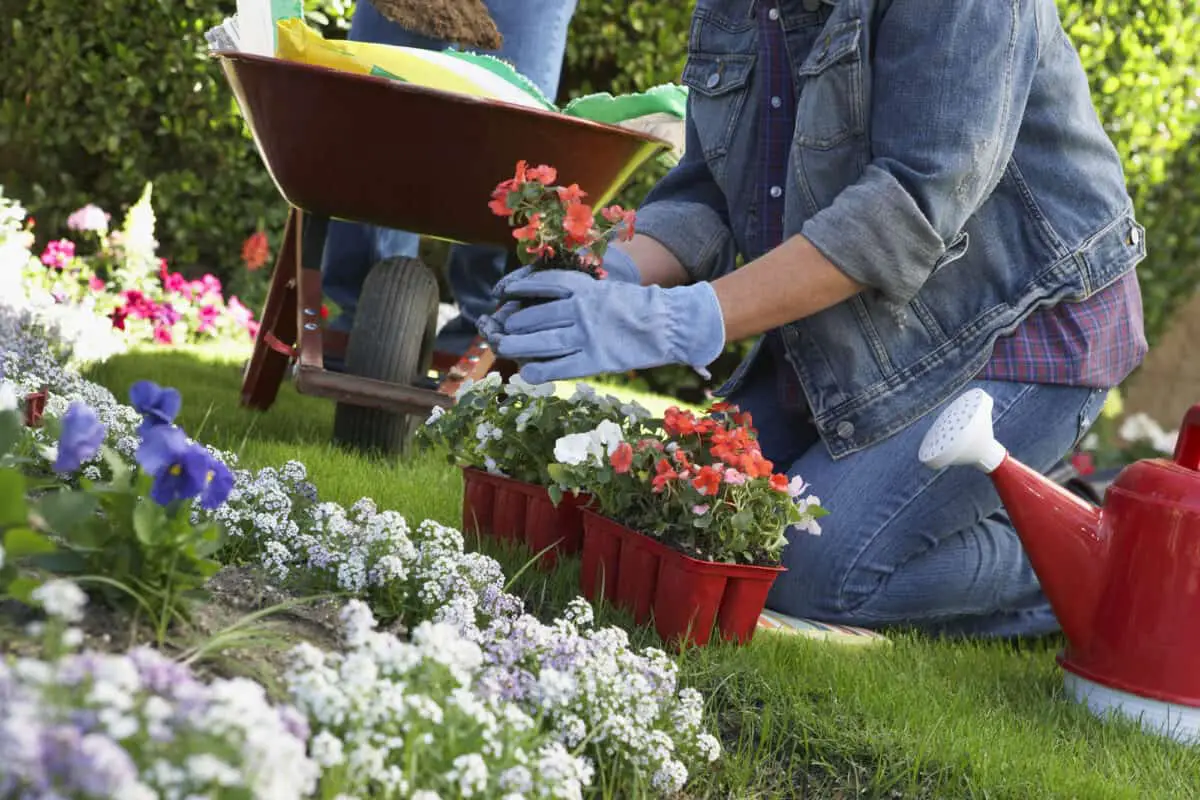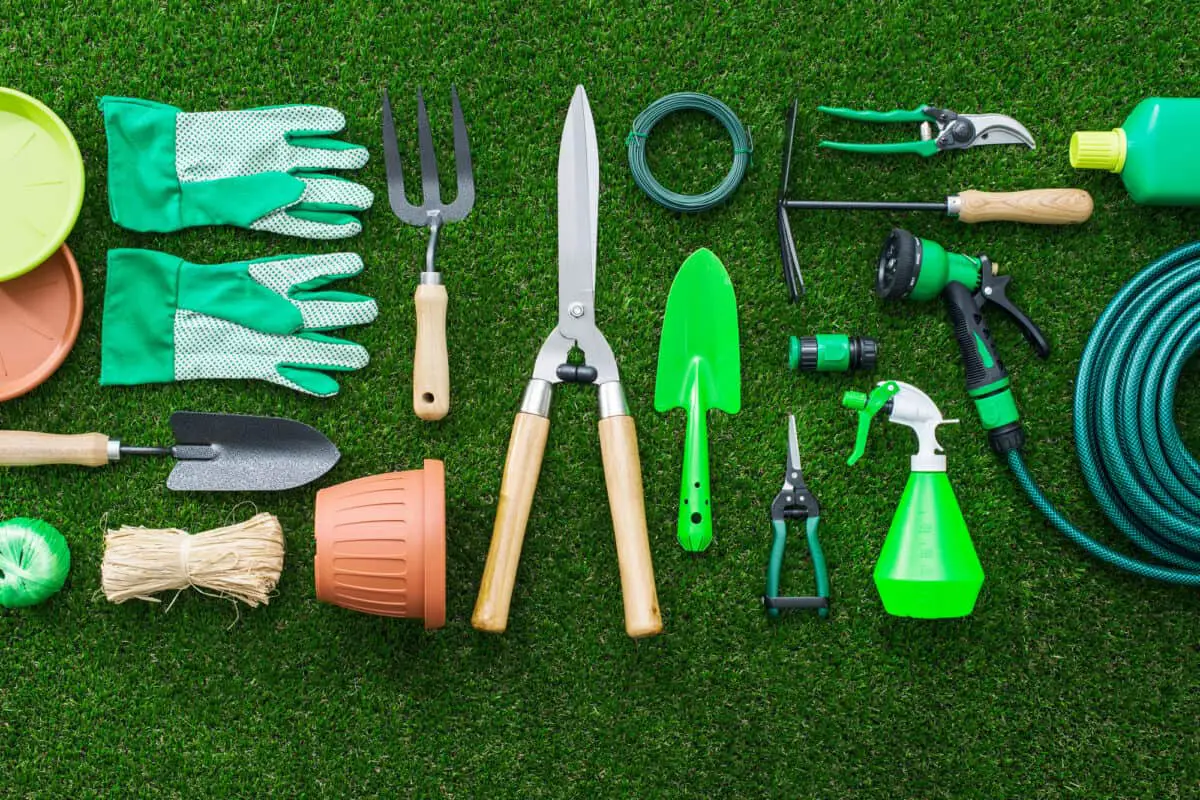Effective garden maintenance tips include plant selection, pest control, proper mulching, consistent watering, planning, and mulching to name a few.
Taking care of your garden can be challenging as you need to monitor various factors to maintain its health.
As a new homeowner, I initially found the idea of gardening and yard maintenance overwhelming and considered hiring professionals.
As my acres grew, so did my anxiety. I found some solid basic pointers that helped me along the way.
You’ll be surprised by the positive results of these simple garden maintenance tips.
These 10 garden maintenance tips can make your life easier

Related Reading: Keeping Neighbor’s Ivy Out of My Yard (4 Tips)
Table of Contents
10 Effective Garden Maintenance Tips
We have the dream of a great escape with a beautiful garden to help us decompress and let the stresses fade away.
Plants, and flowers as part of a well-maintained garden offer a homeowner a sense of enormous pride.
Finding the best way to keep your garden in tip-top shape can be overwhelming.
Once you read these tips, you can simplify a plan to keep your garden healthy and looking great.
Let’s delve into these gardening maintenance tips.
There are many more tips, but these should get you started.
1. Choose Hearty Plants
You should prioritize garden maintenance starting from the time you purchase your seedlings or planters.
It’s best to consider the environmental conditions and your personal level of effort before buying plants for your garden.
It is important to ensure that the plants you purchase are healthy and not invasive or fast-spreading.
These types of plants are difficult to maintain and can overtake your garden, choking out other growth.
You can simplify your life by selecting robust plants from the start.
Here are some of the hardiest perennials:
- Astilbe
- Hellebores
- Hosta
- columbine
- Daylilies
- Gaillardia
- Yarrow
Of all the effective garden maintenance tips, this one is the most important.
2. Remove the Entire Plant When Harvesting
During the process of harvesting, it is important to ensure that all vegetables and fruits are picked clean.
In order to ensure healthy future growth and maintain productive output, it is advisable to remove the entire plant when it is ready to be harvested.
Leaving the fruit or vegetables to overmature can cause a decrease in production and hinder the growth of future crops.
Remove any dirt, debris, or other impurities from the produce before it is packaged or transported.
By doing so, you can help to ensure that the produce remains fresh and safe for consumption.
Always pick all growth until the plant is completely clean. No special tools are needed.
You can get the job done by wearing proper gardening gloves, being patient, and taking your time.
3. Pest Control
When reviewing effective garden maintenance tips, we can never overlook pest control.
Pests can cause significant damage to your garden, so it’s crucial to have a plan in place before the growing season to combat any potential pests.
To prepare for a pest-free garden, it’s important to assess the types of pests that might occur in the area where you plan to plant.
For example, if you have already seen a certain type of insect or small animal that is known to cause issues in gardens, you’ll want to take preventative measures to avoid future problems.
You should not neglect small insects as they might cause harm to your garden.
It is important to detect and prevent pests in your garden as early as possible.
If you plan to grow raspberry bushes in an area where chipmunks are present, it’s a good idea to create a frame using chicken wire around the bush before it starts bearing fruit.
This will help prevent animals from eating all the berries before you have a chance to harvest them.
There is a large deer population within my neighborhood.
When I did some landscaping and added bushes, I made sure they were deer-resistant.
Those bushes are still doing great with just a little trimming from me each year.
4. Deadhead All the Flowers
The process of removing dead flower heads, also known as deadheading, is better for your garden’s health than simply trimming the flowers.
It ensures that the buds stop consuming energy after they have reached their growth expectancy, and allows the plants to bloom again.
If you have flowering shrubs and annuals in your garden, it’s important to deadhead them throughout the year.
The most effective way to remove dead flower heads from a plant or bush is to use a reliable pair of garden gloves.
The deadheads can be left to become mulch at the base of the plant, furthering the health of your garden.
5. Proper Mulching
Proper mulching is one of the most straightforward garden maintenance tips for you to keep in mind.
You will need to create around a 2-inch deep layer of fresh mulch around the base of new plants at the time of planting.
It’s important to keep the soil layer around the plant moist but not too wet.
This will create a protective barrier for the roots and help the plant grow by providing nourishment and shielding it from sun and heat.
At the time of planting and mulching, you must ensure that you pull all the weeds to prevent them from taking root and choking out healthy growth in your garden bed.
6. Regular Watering
Watering the garden on a regular basis seems like a very obvious garden maintenance tip.
However, many garden owners neglect to set up a regular watering schedule due to their busy schedules.
Before planting, create a watering plan with frequency and duration.
You should water your plants only a few times a week, or less often if you live in a damp area that receives a lot of rain naturally.
It is important to group plants with similar water requirements together so that those with a higher water demand are clustered together and vice versa.
This will allow you to water the plants accordingly as you move through your garden.
7. Plant Summer Bulbs
Plant summer bulbs for a beautiful autumn garden.
Some of the best summer bulbs available for you to consider include dahlia, calla, and canna.
After planting them, you can enjoy blooms long after your spring flowers have faded.
These summer bulbs are great for planting in hot and dry climates as they can remain in bloom even under extreme heat.

8. Use the Right Tools
You cannot have effective garden maintenance tips without using the proper tools to make the job more efficient.
When planning your garden, ensure you have the right tools to maintain it during the growing season.
If you plan to plant, make sure you invest in the right tools beforehand.
This will prevent any issues during the growing season that could harm your plants.
Proper tools will go a long way towards ensuring the health and beauty of your garden.
Invest in tools for gardening, such as a rake, gloves, shovel, spade, garden fork, trowel, and proper dirt, mulch and fertilizer.
You don’t have to purchase all of these tools right away.
Start with the basics and add more specialized tools as you become more comfortable taking care of your garden.
The right tools will make taking care of your garden much easier.
For your convenience, this link will offer some basic tools to help with your gardening maintenance. (Affiliate Link)
9. Proper Fertilizing
You must fertilize all plants in your garden according to individual recommendations for each plant or bush.
You should familiarize yourself with the optimal time of year to fertilize your plants.
It is believed, by gardening experts, that mid-summer is the ideal time of the year to fertilize the lawn and garden.
You should stick to this schedule unless otherwise recommended at the time of purchasing your plants.
10. Prepare for Fall Gardening
As summer comes to an end, it’s time to prepare for fall gardening.
You can plant fall garden plants in the last month of summer.
Ensuring their growth while reducing the temperature is possible.
Frequently Asked Questions
What are the best low-maintenance shrubs?
If you prefer a garden that requires minimal upkeep, then it’s best to choose shrubs that are low-maintenance.
Here’s a short list of some of the lowest maintenance shrubs for those who want their garden to look great without all the work:
- Franklin’s Gem Boxwood
- My Monet Weigela
- Fox Red Curly Sedge
- Dwarf Japanese Garden Juniper
- Magic Carpet Spirea
What is the best low-maintenance ground cover?
Ground covers can be beautiful, but they require a lot of maintenance.
If you want to reduce your maintenance effort, consider using one of these ground covers:
- Heuchera
- Brass Buttons
- Creeping Jenny
- Creeping Phlox
- Vinca Minor
What Is the difference between landscaping and gardening?
If you are new to gardening, you may be confused about the difference between gardening and landscaping.
Both share some similarities, such as design, planning, and maintenance.
Landscaping, however, has much more to do with visualizing and planning outdoor spaces.
Gardening involves more than just planting, it also involves weeding, replacing and harvesting.
Landscaping can be compared to dreaming, while gardening can be compared to taking action.
What are the 7 principles of landscape design?
If you’re new to gardening and landscaping, you’ve probably heard of the “7 principles of landscape design”.
These principles can also be applied to gardening. The principles are as follows:
- Simplicity
- Variety
- Balance
- Emphasis
- Sequence
- Scale/Proportion
- Unity
Related Reading: Keep Quail Out of Your Garden: Best Tips for Long-Term Prevention
Final Thoughts
Make things easier with these effective garden maintenance tips for a beautiful and healthy garden year-round.
It’s important to plan ahead and decide the type of gardener you want to be – the kind that spends all day in their backyard or the kind that prefers a low-maintenance approach.
Your garden center can help with ideas if you ask.
Let the garden center know the vision you have, the pests/animals in the area, and the level of your expertise.
Having a beautiful garden shouldn’t be stressful; it should provide a peaceful place.
Follow these effective garden maintenance tips and relax.
Enjoy living the outdoor life!!!
